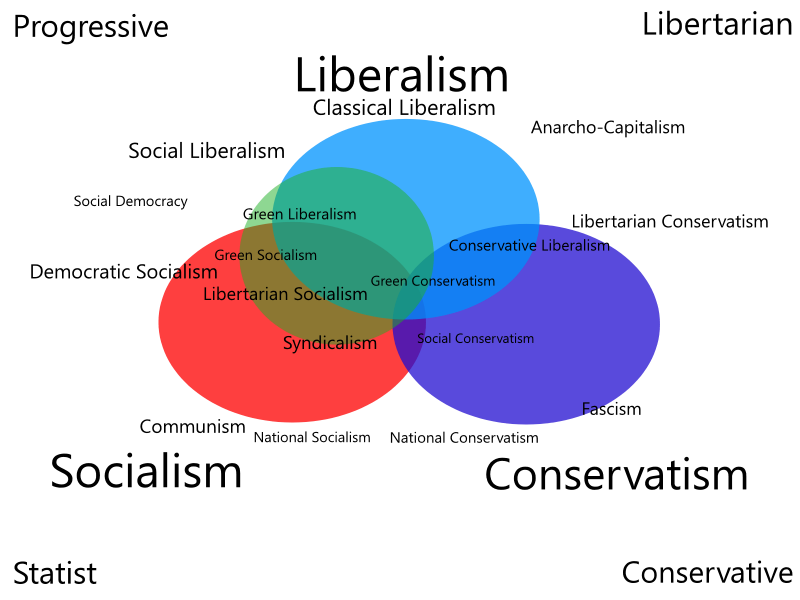Conservatism, Liberalism and Socialism: A Quick Refresher
By Denise Rivette

In this dynamic period of political values in America, I needed a quick check of my understandings of the three main branches of political philosophies. There are many detailed and lengthy sources available, but wanting a quick check, I turned to Wikipedia. Below are portions of the entries under Conservatism, Liberalism and Socialism.
Conservatism
Conservatism is a cultural, social, and political philosophy and ideology that seeks to promote and preserve traditional institutions, customs, and values.[1][2][3] The central tenets of conservatism may vary in relation to the culture and civilization in which it appears.[4] In Western culture, depending on the particular nation, conservatives seek to promote and preserve a range of institutions, such as the nuclear family, organized religion, the military, the nation-state, property rights, rule of law, aristocracy, and monarchy.[5][6] Conservatives tend to favor institutions and practices that enhance social order and historical continuity.[7]
Conservatism has varied considerably as it has adapted itself to existing traditions and national cultures.[10] Thus, conservatives from different parts of the world, each upholding their respective traditions, may disagree on a wide range of issues.[11] One of the three major ideologies along with liberalism and socialism,[12] conservatism is the dominant ideology in many nations across the world, including Hungary, India, Iran, Israel,[13] Italy, Japan, Poland, Russia, Singapore, and South Korea. Historically associated with right-wing politics, the term has been used to describe a wide range of views. Conservatism may be either libertarian or authoritarian,[14] populist or elitist,[15] progressive or reactionary,[16] moderate or extreme.[17]
Liberalism
Liberalism is a political and moral philosophy based on the rights of the individual, liberty, consent of the governed, political equality, the right to private property, and equality before the law.[1][2] Liberals espouse various and often mutually conflicting views depending on their understanding of these principles but generally support private property, market economies, individual rights (including civil rights and human rights), liberal democracy, secularism, rule of law, economic and political freedom, freedom of speech, freedom of the press, freedom of assembly, and freedom of religion.[3] Liberalism is frequently cited as the dominant ideology of modern history.[4][5]: 1
Until the Great Depression and the rise of social liberalism, classical liberalism was called economic liberalism. Later, the term was applied as a retronym, to distinguish earlier 19th-century liberalism from social liberalism.[3] By modern standards, in the United States, the bare term liberalism often means social or progressive liberalism, but in Europe and Australia, the bare term liberalism often means classical liberalism.[4][5]
Socialism
Socialism is an economic and political philosophy encompassing diverse economic and social systems[1] characterised by social ownership of the means of production,[2] as opposed to private ownership.[3][4][5] It describes the economic, political, and social theories and movements associated with the implementation of such systems.[6] Social ownership can take various forms, including public, community, collective, cooperative,[7][8][9] or employee.[10][11] As one of the main ideologies on the political spectrum, socialism is the standard left-wing ideology in most countries.[12] Types of socialism vary based on the role of markets and planning in resource allocation, and the structure of management in organizations.[13][14]
Socialist systems divide into non-market and market forms.[15][16] A non-market socialist system seeks to eliminate the perceived inefficiencies, irrationalities, unpredictability, and crises that socialists traditionally associate with capital accumulation and the profit system.[17] Market socialism retains the use of monetary prices, factor markets and sometimes the profit motive.[18][19][20] As a political force, socialist parties and ideas exercise varying degrees of power and influence, heading national governments in several countries. Socialist politics have been internationalist and nationalist; organised through political parties and opposed to party politics; at times overlapping with trade unions and other times independent and critical of them, and present in industrialised and developing nations.[21] Social democracy originated within the socialist movement,[22] supporting economic and social interventions to promote social justice.[23][24] While retaining socialism as a long-term goal,[25] in the post-war period social democracy embraced a mixed economy based on Keynesianism within a predominantly developed capitalist market economy and liberal democratic polity that expands state intervention to include income redistribution, regulation, and a welfare state.[26][27]



